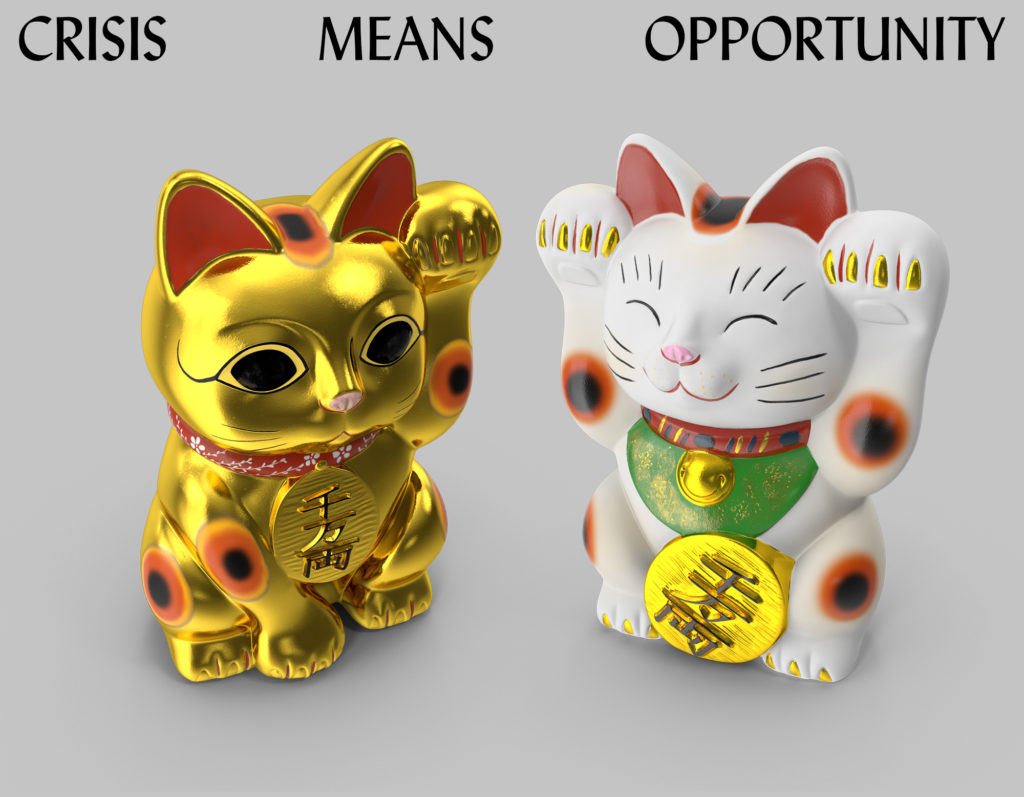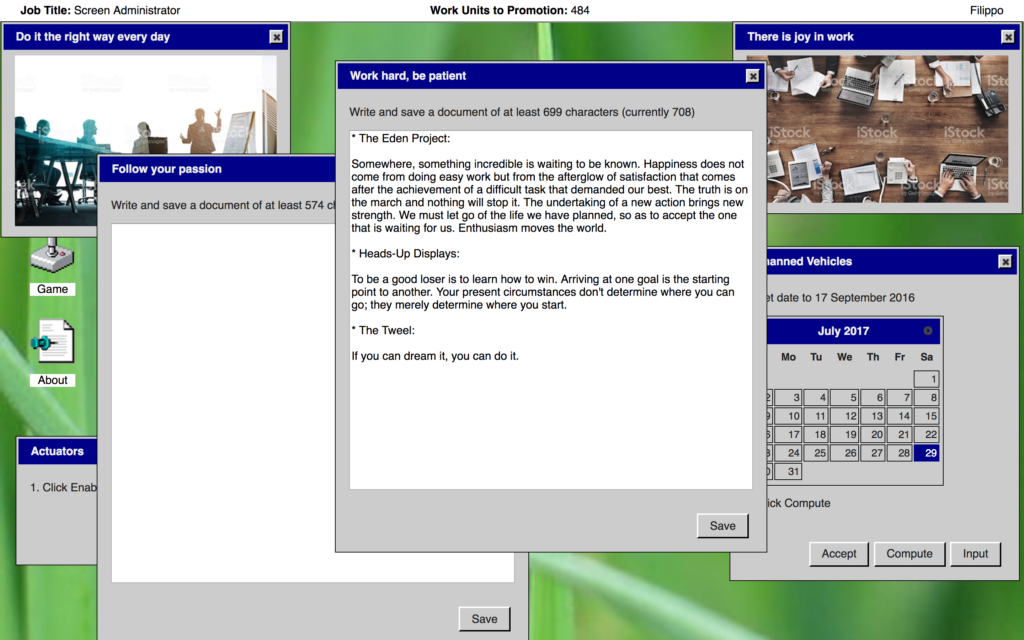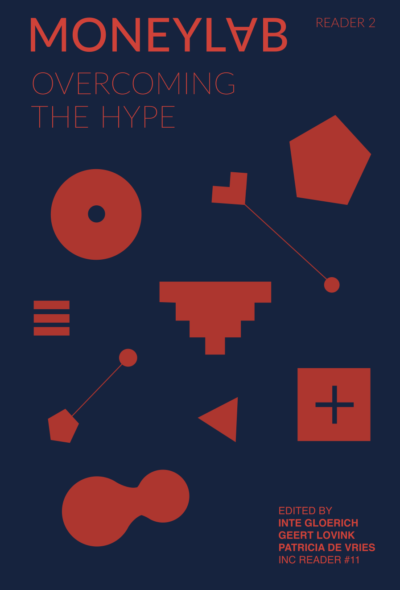The current issue of the Pervasive Labor Union zine includes a letter to the editors that addresses the previous issue of the P.L.U Zine on the Entreprecariat and raises issues on the use of this term. The letter follows, together with my response.
Author: Silvio Lorusso
Fake it till you make it – Genesi del precariato imprenditoriale
Pubblicato originariamente su Pagina99 sotto il titolo “Vi racconto gioie (poche) e dolori dell’imprecariato”. Illustrazione di Krisis Publishing.

A prima vista, ciò che accomuna quell’ampio segmento demografico che va sotto il nome di Millennials è soprattutto la tecnologia. I nati orientativamente tra il 1980 e il 2000 sono infatti i primi ad aver vissuto pienamente la rivoluzione digitale, e già ne commemorano nostalgicamente gli albori. Eppure c’è un altro aspetto che contraddistingue questa generazione rispetto a quelle precedenti. Mentre i baby boomer hanno potuto contare su una carriera stabile e la Generazione X ne ha lamentato i limiti, per i Millennials un percorso privo di deviazioni risulta illusorio se non addirittura antiquato. È l’idea stessa di carriera che vacilla, a fronte di un orizzonte condiviso caratterizzato dall’incertezza costante.
Towards an Incoherent Refusal of Efficiency by Lídia Pereira
This contribution by Lídia Pereira is part of the special issue of the Pervasive Labour Union zine on the Entreprecariat. Read it here and download it for free as PDF or EPUB.
“efficient (adj.)
1. (of a system or machine) achieving maximum productivity with minimum wasted effort or expense.
2. (of a person) working in a well-organized and competent way.” (Oxford Dictionaries)“Efficiency is a measurable concept that can be determined by determining the ratio of useful output to total input. It minimizes the waste of resources such as physical materials, energy and time, while successfully achieving the desired output.” (Investopedia)
From the latin verb efficiō –meaning to execute, to accomplish– the modern sense of the word ‘efficient’, according to the same Oxford Dictionaries from where I extracted the opening quote of this text, only came into existence in the late 18th century, roughly around the same time as the Industrial Revolution was entering upon.
Taylorism, a theory of labour developed from the 1880s onwards by Frederick Winslow Taylor –himself one of the main influences within the ‘Efficiency Movement’– was committed to the quest of achieving the perfect ratio of “useful output to total input” to such an extent that some of its proponents went to the point of collapsing the person with the machine as a desired outcome. One such example is Alexei Gastev, founder of the Central Institute of Labour in the Soviet Union, advocate of the “principle of mechanization” and the “biological automatization” of workers (The Charnel House, 2011).
First as Arts, Then as Tragedy — Two Cents on Personal Crowdfunding and Creative Entrepreneurialism
This text is a contribution to MoneyLab Reader 2: Overcoming the Hype, edited by Inte Gloerich, Geert Lovink and Patricia de Vries. Read it here and download it for free as PDF or EPUB. The text was also published in Italian on Not.
Crowdfund Everything
What is crowdfunding for? One could assume that, if asked such a question, most of the people that know this word (according to a study by the Pew Research Center, 61% of Americans have never heard of it[1]) would refer to innovative products or services, album releases, documentaries, books, videogames, or comics. In other words, they will be inclined to associate crowdfunding with the endeavors of tech startups and the creative industries.
This assumption is partly confirmed by the data available on the highest funded crowdfunding projects[2]. Besides the great number of cryptocurrency-related campaigns run independently or through Ethereum in the top ten, most of the projects were hosted by either Kickstarter or Indiegogo, both platforms generally used to finance creative or innovative undertakings. Of course, the sheer amount of money raised lures a comparable magnitude of media attention, thus establishing a feedback loop between the aggregation of a large public through big news outlets and financial success. This is the case of Pebble, a smartwatch idea which collected more than 40 million dollars during three separate Kickstarter campaigns. This massive crowdfunding achievement didn’t prevent the company from shutting down after four years of activity.
All Things Optimal by Michael Dieter
This contribution by Michael Dieter is part of the special issue of the Pervasive Labour Union zine on the Entreprecariat. Read it here and download it for free as PDF or EPUB.
- ‘Precariousness’ bears down on the entrepreneur and precariat alike, yet each holds markedly different relations to insecurity and risk. Both are entangled with the competitive threats and inequalities of the market, but are ultimately distinguished by an inverse capacity to exploit such uncertainties. If the entrepreneur and precariat appear as ubiquitous social categories, their applicability needs to be considered across gradations of disparity and socio-economic positioning. To speak of the entreprecariat is thus to invoke an ambivalent intersection of competing forces of struggle and subjectivation, liberation and vulnerability, creative destruction and control, autonomy and exploitation; and to size up the devastating stakes of late neoliberal societies.
Review of ‘The Founder’ by Gui Machiavelli
This review by Gui Machiavelli is part of the special issue of the Pervasive Labour Union zine on the Entreprecariat. Read it here and download it for free as PDF or EPUB.

The Founder by Francis Tseng
In The Founder, a self-described dystopian business simulator created by Francis Tseng in 2017, the player is put in the place of a nameless entrepreneur, the embodiment of “disruptive innovation.” The game’s Founder starts working in their living room and focussing on either IT or Hardware, eventually hiring employees, expanding into new locations (London, Antarctica, Bangalore, Lagos) and industries (entertainment, military, space engineering), researching new technologies, lobbying for changes in legislation and, most of all, keeping profits growing at a steady rate of 12% per year.
Review of ‘It Is as if You Were Doing Work’ by Gui Machiavelli
This review by Gui Machiavelli is part of the special issue of the Pervasive Labour Union zine on the Entreprecariat. Read it here and download it for free as PDF or EPUB.

‘It is as if you were doing work’ by Pippin Barr
Dear user,
We were humbled by the overwhelmingly positive responses to It is as if you were doing work 👷♀️, the simulation created by Pippin Barr in which you get to file reports 🗒📉👨💻🏧🌐, watch progress bars and fiddle with arcane inputs to get that retro feeling of doing work 📈🗄👩💻📋📨❣️ After years of depression and aimlessness in our post-work society, countless users such as yourself have finally started to feel once again like their lives and their efforts actually mean something. Your continued operation of this system not only comes to us as an honest compliment 🙏, it is also a clear sign that we have struck a chord with our users.
How to Make Yourself into a Commissioning Body in 5 Easy Steps by Anxious to Make
This contribution by Anxious to Make (Liat Berdugo + Emily Martinez) is part of the special issue of the Pervasive Labour Union zine on the Entreprecariat. Read it here and download it for free as PDF or EPUB.

The art collective, Anxious to Make, is taking artistic entrepreneurship to the next level. From existential anxiety to art market worthy end product, Anxious to Make proposes that by outsourcing all of the facets of artistic practice (and life) to gig workers and algorithms, anyone can make themselves into a creative enterprise and achieve the neoliberal dream.
Anxious to Make developed a workshop and methodology – along with a series of online generators, commissioned performances, interactive quizzes, and an analog algorithm, made literally out of paper – to walk artists through common blockages and offer solutions that can be commissioned through the sharing economy, gesturing toward an endless productive duplication.
MoneyLab Reader 2 is Out
MoneyLab Reader 2: Overcoming the Hype is out. It includes an essay of mine entitled “First as Arts, Then as Tragedy — Two Cents on Personal Crowdfunding and Creative Entrepreneurialism”. The essay is also available in Italian on Not. Order or download a free copy of the book here here. More information:

Art (…) Work by Martine Folkersma
This contribution by Martine Folkersma is a shortened version of the introduction to the novel-thesis ‘Art (…) work’, written for the Gerrit Rietveld Academy, department DOGtime IDUM 2017. The text is part of the special issue of the Pervasive Labour Union zine on the Entreprecariat. Read it here and download it for free as PDF or EPUB.
Art (…) Work shows the divergent positions, workings and subjectivities of artist and worker. The worker behind his desk and the artist in his studio are exemplifications of different roles and identities shaped by a complex of societal (mainly capitalist) constructions, myths and beliefs. The division of the individual in a worker (in general someone with a daily, money-earning job) or an artist (someone who creates artworks, in general in general a practitioner in the visual arts) is a capitalist, Fordist way of assigning the individual its pre-described role and position within society. The worker mostly subjugated to place and time regimes, is in sharp contrast with the artist who is freed from these constrictions by being ‘his own boss’.
The artist (the epitome of this idea of self-reliance) has currently served neoliberalism in exemplifying this notion to us all. The artist has become an example for the worker to become an ‘entrepreneur’, to become free and autonomous in making his own decisions, free in dealing with his own ‘personal management’, also as far as income and (in)security is concerned.

